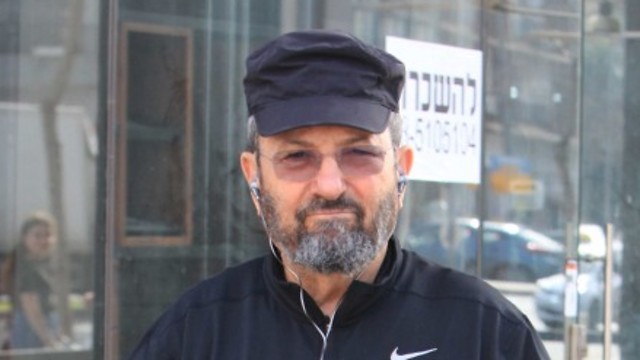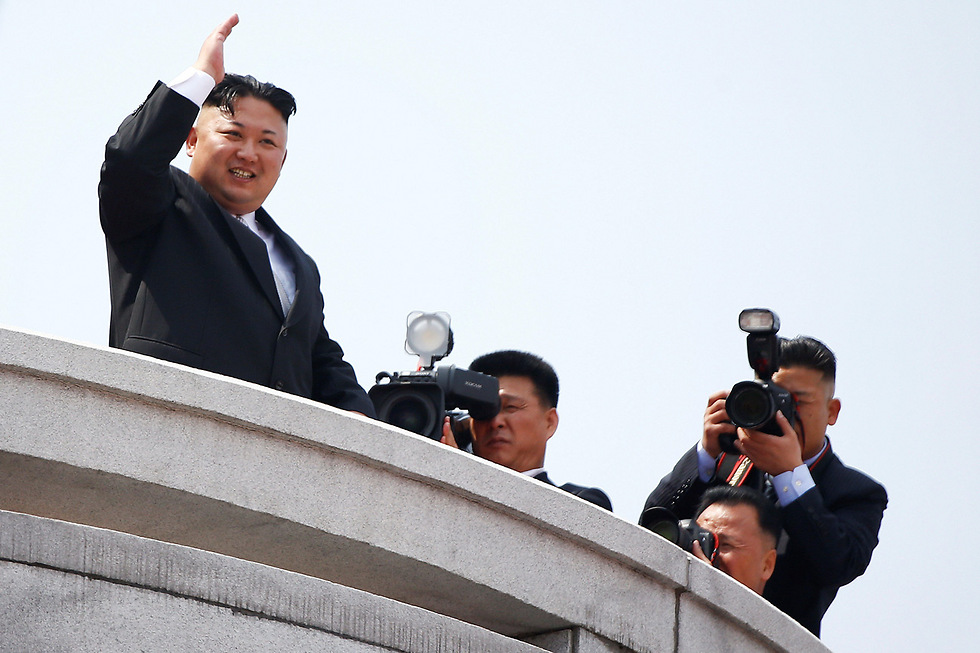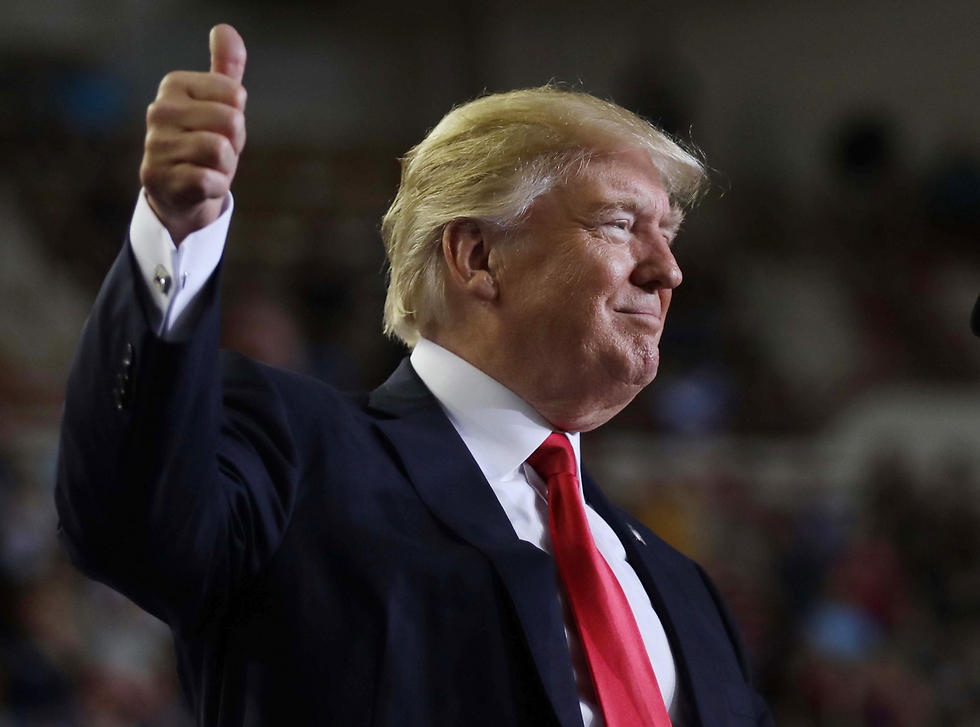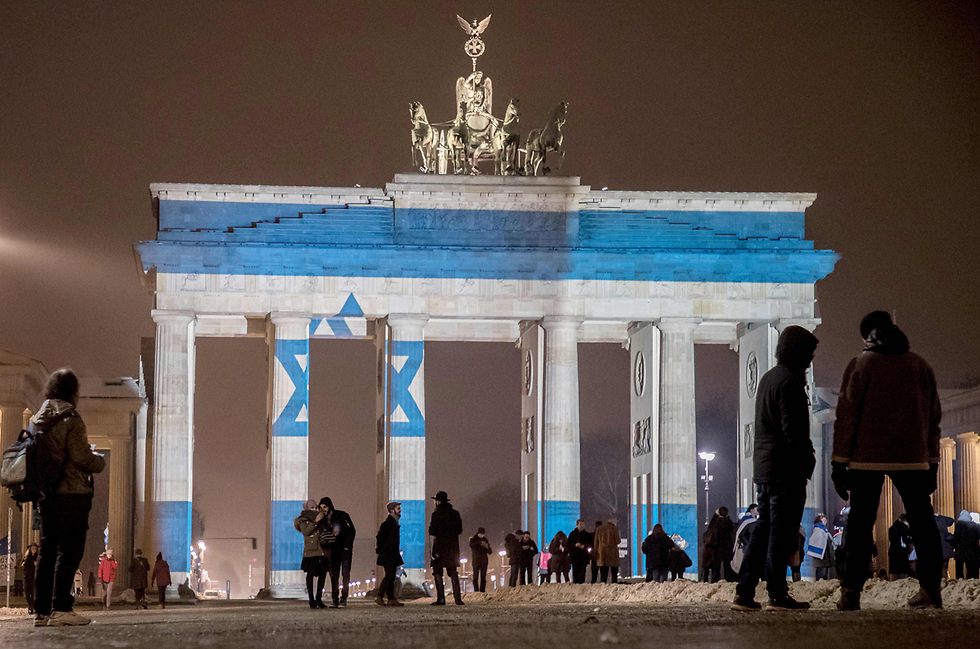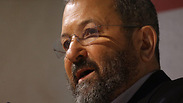

Why didn’t Israel strike in Iran? Ehud Barak explains
In a special interview, the former defense minister reveals what happened to his and Prime Minister Netanyahu’s plan for a military operation against Iran’s nuclear program and responds to criticism over the billions invested in preparation for the attack. ‘We must remember,’ he says, ‘that the Iranian project has not disappeared—it has only been postponed.’
Benjamin Netanyahu doesn’t respond to questions; this term, he speaks to the nation one-sidedly through Facebook posts. Ehud Olmert is unable to respond to questions for known reasons. The only one who can is Ehud Barak.
I met Barak last week for a conversation that lasted several hours. Do you believe, I asked, that the conflict between America and North Korea could develop into a war?
“Once,” Barak said, “during a meeting with a senior Chinese government official, I asked him what he thought about North Korean leader Kim Jong-un. ‘What do you want from us?’ the Chinese man replied. ‘He was educated with you, in the West (which is true—Kim attended a boarding school in Switzerland for children from rich families).’
“What’s unique about this conflict is that it has more than one unpredictable player. Kim Jong-un is faced by an American president whose next move is very difficult to predict. There is a certain advantage in uncertainty, but there are risks as well.
“A few positive things have happened in the first 100 days of the Trump administration. He quickly broke off ties with Gen. Michael Flynn and replaced him, as national security advisor, with Gen. McMaster, who is indisputably a good man.
“Trump reduced the influence of the radical Steve Bannon and normalized the National Security Council system. This proves an ability to learn. At the same time, he is rewriting the rules under which the US president operates.
“Take his decision to strike Syria, for example. The significance of the operation is nowhere close to Netanyahu’s exaggerated praise. Trump chose the narrowest hit in the book. Nevertheless, he managed to surprise.
“The United States is still the strongest country in the world. The American defense budget is larger than the sum of the defense budgets of China, Russia, Germany, Japan, France and other countries. When the US president says, ‘Enough, we’re done being latched onto,’ it means something.”
Trump, I said, clashed in this short period of time with Russia, with China, with North Korea and with Iran.
“Russia is a different story,” he said. "In spite of all the contradictions, at the end of the day (Russian President) Putin leads a European state, a Christian state. Trump is figuring him out.
“The places where there is a risk of a mishap are Iran, North Korea, and—in a different manner—China. There are considerations of prestige, and it’s difficult to understand the rival before it’s too late. The crisis could erupt over an American ship sailing near one of the islands in the South China Sea or over an aircraft sortie.
The Chinese are saying, ‘It’s time for the Americans to understand that we are equal. Just like the Americans won’t let our planes approach the coast of San Francisco, we won’t have their planes approach our coasts. Our skies are like their skies.’
“In the end, Trump gathered around himself a group of serious people. Nevertheless, they aren’t immune to mistakes. Groupthink, being dragged by the leader, reading risks incorrectly—all that could happen, and such things have happened.”
More hawkish than Netanyahu on Iran
I would like to go back to your years as defense minister in the Netanyahu government, I said. You and Netanyahu pushed for an Israeli military operation against Iran. What did you really want? Three possibilities come to mind: First, you wanted a war; second, you thought that the Israeli threat would make the Americans aggravate the sanctions; three, you thought that a limited Israeli military operation would force the Americans to enter an extensive war with Iran.
“The intention," Barak replied, "was both to make the Americans increase sanctions and to carry out the operation. I was more of a hawk than Netanyahu.
“We assumed that the Americans knew everything—both about the operation and about the opposition to the operation on the part of Chief of Staff (Gabi) Ashkenazi, Mossad chief (Meir) Dagan, Military Intelligence Director (Amos) Yadlin and Shin Bet chief (Avi) Diskin. We knew that there were people here who were speaking to them on a daily basis.
“I spoke with President (George W.) Bush and, at a later stage, with President Obama. I made it clear to them that when it came to Israel’s responsibility for its security, we would be the ones to make the decisions, not them. The two presidents didn’t like our plans, but they respected our right to decide.
"At some point, the secretary of defense asked me how much warning we would give the Americans. I said to him, ‘We have to surprise. We won’t be able to give you more than a few hours. Our announcement will be worded in a way that won’t put a single American soldier at risk.’
“Despite their objection to the move, they made it clear that even if we did attack, they would keep all their commitments to Israel.”
The opponents, I said, claimed that you invested NIS 11 billion in preparations that went down the drain. “The investment was completely justified,” Barak said. “We built a web of abilities. We must also remember that the Iranian project has not disappeared. It has only been postponed by 10 years.”
‘Bibi doesn’t like making decisions, I do’
Meir Dagan, I said, argued that a military operation would be ineffective. In fact, it would make it easier for Iran to advance its nuclear program. He described your discussions as a party of whiskey and cigars.
“Dagan, "Barak said, "described us as a trigger-happy group. That wasn’t true. The operation was intended as a last resort. Iran didn’t choose a nuclear program like Libya’s or South Africa’s, which was basically meant for deterrence purposes. It chose North Korea’s way. If Iran obtains a nuclear weapon, it will fundamentally change the situation in the region and could turn into an existential problem for Israel.
“Opponents said it would take the Iranians only few years to restore the project. That’s inaccurate. Before we bombed the nuclear reactor in Baghdad, we were unable to accurately estimate how long it would take the Iraqis to rebuild it. The other side is usually afraid to go back and build what has been destroyed. Other things happen.”
That likely also applies to the reactor which Israel attacked in Syria (according to foreign sources).
“In Israel,” Barack explained, “an operation is approved only if the three corners of the triangle exist—an operational ability, international legitimacy and a need to operate now because it will be impossible to operate later.
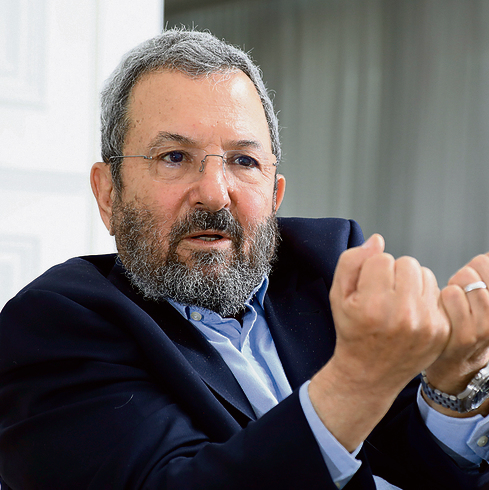
“The nuclear project is not like a car that can be attacked so long as it’s exposed on the road. It’s more like a train that is slowly entering a tunnel: Each car that enters the tunnel reduces the operation’s effectiveness. That’s the meaning of the immunity zone (a term coined by Barak that refers to the critical point in time after which Iran’s nuclear program will no longer be vulnerable to a military strike).
“The chief of staff’s objection to the operation doesn’t necessarily prevent it—the decision is in the political ranks’ hands. But when the operation was raised for discussion in 2010, Ashkenazi said: ‘We have no operational ability.’
“When a chief of staff says there’s no operational ability, that’s it, the approval doesn’t pass the threshold. Unfortunately, those who opposed the plan were backed by the President’s Residence, by Shimon Peres. I failed to convince both him and the other opponents, although I put many hours into it.
“Obama asked me about the opposition to the operation in Israel. I said to him, ‘Don’t you have these kinds of things in America? When they, the opponents, look up, they see us. When we look up, there’s nobody there. The responsibility is on us.’
“In 2011, the chief of staff was (Benny) Gantz. He said, ‘I believe the operation is wrong, but there is an operational ability.’ We convened the narrow forum of eight ministers. We estimated that if the eight-minister forum voted in favor of it, so would the cabinet. We divided the work between us: Bibi said he would handle (Moshe) Ya’alon and (Yuval) Steinitz. ‘It will be okay,’ he told (Avigdor) Lieberman and me. And then Steinitz and Ya’alon spoke against it.”
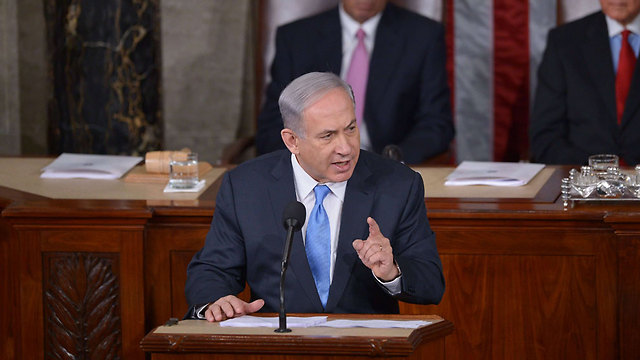
Do you think Bibi changed his mind, I asked.
“I’m not sure he made such a big effort to convince,” Barak said. “From year to year, my doubts concerning his determination to act increased. I suggested that he advance the Palestinian issue, if not in order to reach an agreement, then at least in a bid to secure broad international support for an attack on Iran. I said to him, ‘It’s like in chess: You sacrifice a pawn to get the queen.’ He may have been scared by the need to do something on the Palestinian issue.”
Or he may have been deterred by the magnitude of the decision, I said. He was afraid to take responsibility for a decision that all the security establishment heads were against.
“It’s possible,” Barak said. “Bibi doesn’t like making decisions. I do.
“In 2012, Netanyahu toyed with all kinds of ideas. I was opposed. I reiterated my stance: We would not put a single American soldier at risk.”
A different kind of trust
One of Barak’s less successful political adventures was splitting the Labor Party in 2011 and creating a faction called Independence, which didn’t last very long but helped Netanyahu remain in office.
Why, I asked.
“Only because of Iran,” he said. “I saw how difficult it was to pass the decision with me inside (the government), and I knew it would be even more difficult if I were outside. When I failed to convince my friends at the Labor Party, I split. There are things that are more important than a party.”
What did you think, I asked, about Netanyahu’s address to the two Houses of Congress against the agreement?
“A day after the Americans signed the agreement with Iran, Netanyahu summoned me for a consultation. I was outside of politics.
‘The deal is bad,’ I told him. ‘We don’t need to hide our opinion, but moving the battle to Congress is inadvisable. The chance of succeeding is slim. Speaking at AIPAC and speaking at the Congress committees, as is customary, will suffice.’
“But the actual appearance there was important to him. He couldn’t resist the temptation. If he quarrels in public with the president, he’s as big as the president. Apart from that, he wanted to serve the right wing of the Republican Party. It ended in a lot of damage.”
Why damage, I asked.
“Because he missed the opportunity we had immediately after the agreement was signed,” he replied. “At that time, we could have received $45 billion in aid for 10 years, not 38 billion; we could have expanded the intelligence cooperation and reached agreements on the conditions for aggravating the sanctions; we could have received measures that would have allowed us to take military action against the nuclear program under the new conditions. We could have reached a completely different kind of trust.”
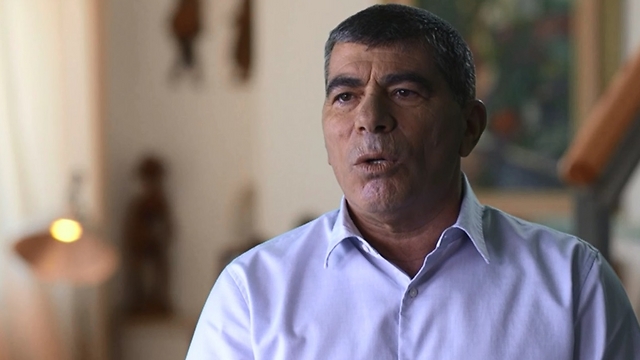
Why do you think Obama accepted such an agreement, I asked.
“Because Obama isn’t naïve,” he said. “He realized that Iran would live up to the agreement at first, when it would be worthwhile, but would return to the nuclear project later on. The solution was to provide Israel with the means that would allow it to act. That was thwarted by Netanyahu in his Congress address.”
‘A troubled government’
In one of his meetings with Russian President Vladimir Putin, Barak spoke highly of the immigration to Israel from the former Soviet Union and its great contribution to Israel’s education, economy, science and art. “Why don’t you give us a million more immigrants?” Barak suggested at the time.
“I’m not sure we have a million more Jews in Russia,” Putin said.
“I’m sure there are a million Russians who are willing to come to Israel,” Barak replied. “If needed, we’ll get them Jewish babushkas, and they’ll become Jewish.”
On the eve of Memorial Day and Independence Day, Barak insisted on seeing the half-full glass. The historian, diplomat and politician Dr. Shlomo Ben-Ami once said that the Zionist project was the most successful national project of the 20th century, and Barak completely agrees.
“We started from nothing,” he said. “Despite seven wars, two intifadas and countless military operations, our population has multiplied by 12, the gross national product has multiplied by almost 70, the shekel is one of the strongest currencies in the world, and the number of NASDAQ-listed Israeli companies is higher than any other country outside of North America. The Middle East is a difficult setting. We’re really a villa in the jungle, and nonetheless, we are the strongest country in the Middle East.”
If things are so good, I asked, why do you say that things are so bad?
“Because we have a government which is leading Israel to a slippery slope. The threat is to the actual Zionist project.”
Aren’t you sowing panic like Netanyahu, I asked.
“Absolutely not,” he said. “The current government’s agenda is inevitably leading to one state between the Jordan River and the Mediterranean Sea. If democracy is preserved, there will be a state here with an Arab majority and a civil war; if democracy breaks, it will be an apartheid state at a risk of collapsing. This is the existential threat.”
What happened to the Iranian nuclear program, I asked.
“The threat has been postponed by 10 years,” he said, “and there are many other options of dealing with it.”
Barak spoke about Rabbi Zvi Yehuda Kook, the father of settler messianism, who he said was peeking from behind Netanyahu’s shoulder. “The one-state logic is inevitably leading the Right to weaken the legal system, civil society and the free media. The Right has to undermine the IDF’s world of values.
“Deputy Foreign Minister Tzipi Hotovely said that left-wing organizations are anti-Israel traitors. They are neither traitors nor anti-Israel.: They’re anti Israel’s governments—all of Israel’s governments.
“Deputy Foreign Minister Tzipi Hotovely said that the left-wing organizations are anti-Israel traitors. They are neither traitors nor anti-Israel—they are anti Israel’s governments, all of Israel’s governments. It wasn’t Menachem Begin who said, ‘Without the High Court, without B’Tselem’—it was Yitzhak Rabin. We didn’t like them, but we knew they were not violating the law and we respected it. Netanyahu is the one who is building them now.
“The person who tried to terrorize the military judges in the Elor Azaria affair is now the defense minister. He may be speaking differently, but he’s just playing with words. This isn’t a levelheaded government; it’s a troubled government.”
Do you have anything to say to the young Israelis, mostly left-wing voters, who are leaving for Berlin, I asked. Can you understand them? Can you imagine yourself at their age, thinking and talking like them?
“I don’t like this phenomenon,” he replied, “but I can understand where it’s coming from. These young people were raised on liberal values, focusing on the individual. You land in Berlin, New York or London and easily find your place. Right-wing, traditional societies put a greater emphasis on the values of the community—being loyal to the group, accepting the authority of its leaders, and knowing that there are things which are sacred. I don’t underestimate these values—they give meaning to life, a distinction between them and others. They are a very important political and social tool.
“Over the past 30 years, the balance between these two groups of values has been violated. The Left has adopted the values of the individual and abandoned the values of the community. It has given up David Ben-Gurion’s ambition to create an exemplary society.”
Barak believes that the other Left, which made security its priority, can be revived. “The government talks about security but harms security when it settles throughout the entire territory. It is trying to undermine the Palestinian Authority. Who does it think will replace the PA? Beitar? Bnei Akiva? No, it will be replaced by Hamas. The Right finds Hamas more convenient. Hamas will come and will bring down rockets on Kfar Saba.”
No interest in returning to politics—for now
Barak turned 75 in February. I asked him if he would return to politics.
“I’m receiving many appeals,” he said. “At this stage, I have no interest. I think that part of people’s willingness to listen to me has to do with the fact that I don’t want anything. If I were perceived as someone who wishes to achieve something, it would have come back to haunt me.”
You do realize that your response opens a tiny window, I said.
“I can’t ignore the fact that circumstances may be created,” he said. “This isn’t something I’m hoping for. But this isn’t about me, it’s about Netanyahu.”














